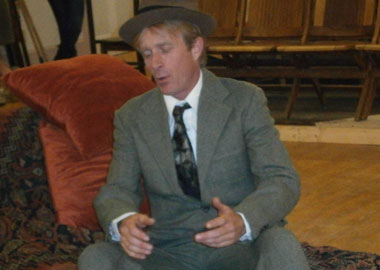I dipped into The American Clock a couple of weeks ago for a column on plays set in the Thirties. Intrigued by the play’s theme and scope, I’ve been digging a little deeper into it. It’s a show I’d previously only heard of, written by one of America’s master playwrights, Arthur Miller, but generally considered a flawed work, ambitious but unwieldy.
Partly because of this reputation and partly because of its sheer size—more than 50 roles in dozens of scenes, plus songs, with a wide-angle lens that takes in the entire country—it’s seldom performed. So Ashfield Community Theater’s current production, fielding a cast of 20, provides a rare chance to experience this theatrical kaleidoscope.
Set in the depths of the Great Depression, Miller’s script is based partly on the first-person testimonies in Stud Terkel’s oral history Hard Times. Centered on one family whose hopes and fortunes have been crushed by the stock market crash, the play sprawls across years and time zones to create what the playwright called “a mural for the theater”—a multifaceted portrait of America in adversity. The central story is mirrored and enlarged by vignettes that peek into other lives dislodged by the national cataclysm, from Wall Street high-rollers brought low, to Dust Bowl farmers, to rail-riding hoboes.
For the show’s director, Martin Shell, the play speaks directly to our own Great Recession and even resonates with the Occupy movement. Miller, he says, “was curious about how a collective crisis can wake up an entire country to the real possibility of social change.” Shell also sees the piece as a commentary on the magical thinking that feeds that elusive American Dream—”the American’s conviction that his belief in success and happiness will bring success and happiness. But as Miller has said, there is also this waiting for the other shoe to drop—looking over their shoulder for the other guy who might push them off the cliff. So what happens when that belief doesn’t work, when they discover the titans of finance and politics are crooks or idiots, and the whole country’s off the cliff?”
Miller subtitled The American Clock “A Vaudeville,” and it takes the form of an old-time variety show. In his notes on the play, he pointed out that the hardships of the Depression not only created a national climate of sacrifice and common cause, but also unleashed “a flood of humor and optimism that was far less apparent in seemingly happier years.” The scenes are framed by songs of the period that comment cheerfully on the country’s low spirits: “Who cares what banks fail in Yonkers/ As long as you’ve got a kiss that conquers?”
Within the play’s epic framework, Shell finds Miller’s writing “clear and crisp and wonderfully rhythmic without affectation” and its quick-change juxtapositions of mini-narratives “stark and very interesting.” The title comes from the notion that time is running out for the social and economic structures that depend on wealth and poverty, boom and bust. As one character sees it, “There’s never been a society that hasn’t had a clock running on it, and you can’t help wondering—how long? How long will they stand for this?”
The American Clock: June 1-2, 7:30 pm, Ashfield Town Hall, (413) 628-4574, acth.org.
Contact Chris Rohmann at StageStruck@crocker.com.



